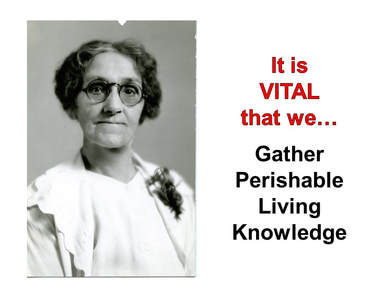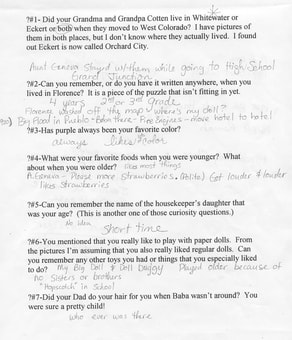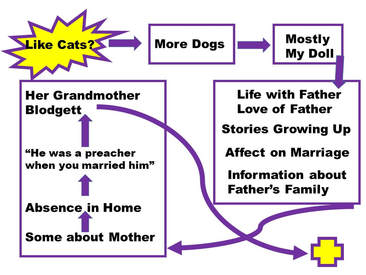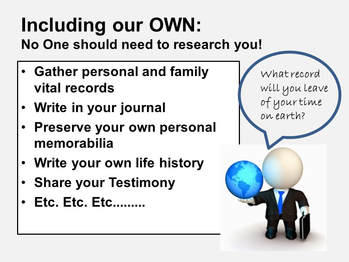| interviewskillstipsquestions-ptime.pdf |
Interview Skills, Tips and Questions
Don't wait until it's too late!

#1 Key: Prepare Before You Start Your Interview
• Review what you already know
• Gather any relevant documents, photos or charts
• Make a target list of information you hope to learn
• What is your goal?
?-- Is this a “names and dates” fact finding mission?
?-- Do you want to learn more about the life of the person you are interviewing?
?-- Does the person have documents or photos that you want access to?
• It will be very disappointing to them if you are after “facts,” and they were under the impression that you wanted to interview them about their life.
Additional Preparation:
- Make arrangements to record the audio and video of the interview if the person agrees to it.
- Having one additional person there to take notes can be very valuable.
- Make sure that you and your helper both are familiar AND comfortable with the technology you will be using.
- Hold the interview in a place that is comfortable for the person you are talking to, but that is as quiet as possible.
- Prepare an INTERVIEW NOTES sheet before going to the interview. Take notes during the interview, but focus on the person not your notes.
Possible Ice Breaker for the Reluctant:
Look at a photo album or other family memorabilia with the person and ask them to tell you the stories behind the pictures or items.
During the Interview:
- Ask open ended questions rather than "yes" and "no" questions. Use the phrases:
?--"Describe...",
?--"What was it like...",
?--"What would your great-grandchildren wish you had told me?" etc.
- LISTEN CAREFULLY!
- Do not interrupt them while they are talking, especially if it is to ask another question.
- Listen with your heart to their feelings and emotions. Don’t just go for the facts.
- Phrase your questions and responses carefully so that the person does not feel that you are judging them.
- Go with the flow; BE FLEXIBLE…even if your list of questions isn’t answered. You don’t know what it is that you don’t know.
- Ask for clarification or details ONLY after the person has finished their thoughts.
o Ask the person about any written records they have that they would let you copy.
- Quit when a person gets tired or frustrated!
o Do not press a person for information they cannot remember. Pressing for birthdates or names of ancestors may frustrate them and cut you off from other information you may have gotten or from future interviews.
Interview Follow-up:
- Ask others who know the person to fill in the gaps.
o Children may have heard their parents or grandparents stories often enough to correct or clarify things that you don’t understand.
- Transcribe any notes taken during the interview and fill in as much detail as you can remember. DO NOT rely on your memory for the details.
- Send a thank-you note or small gift to the person you interviewed.

Telephone Interviews:
If not interviewing in person, send a list of questions to the person and then call them and get their responses.
This generally works better than asking them to write out their responses.
If not interviewing in person, send a list of questions to the person and then call them and get their responses.
This generally works better than asking them to write out their responses.
- Keep a copy of the list of questions so that you can take notes when you call them.
- This works especially well with a person who is going deaf. When you send them the questions also give a time that you will call—and make sure you call at THAT time. When you call, they can start talking without you trying to make your questions heard.
- If they also have a hard time seeing, print the questions in a large bold font such as a point 16+ Arial.
Final Thoughts:
Sample Interview Questions Follow, BUT PLEASE REMEMBER:
- Don’t be too quick to evaluate the value of information given or the value of documents shared. There may be clues that you don’t understand until you know more about the family.
- NEVER ASSUME that someone else will take care of this. My grandmother gave me many of her ancestral photo albums. Without them as memory joggers, I would have missed a lot of information. Not very long after we talked her step-children threw out the rest of her photo albums to make more room in her basement.
- Don’t make someone have to research YOU in the future.
Sample Interview Questions Follow, BUT PLEASE REMEMBER:
- YES, What are the facts??
- BUT, What are the feelings behind the facts??
- WHAT will help you truly get to know the person you are interviewing??
| interviewskillstipsquestions-ptime.pdf |
Sample Interview Questions:
Remember: ask Open Ended Questions--
Sample questions follow, but the list is by no means exhaustive. Phrase these questions in an open ended way.
WHO?
What do you feel the strongest about?
What things are the very most important to you?
- Have the person describe a typical day growing up.
- What is a typical day as an adult like?
- Ask the “expected” questions, but also ask some unexpected ones such as: “What do the contents of your purse or briefcase tell about you?” or “Describe your cooking skills as a newlywed.” or “How do you feel about doctors and dentists?”
Sample questions follow, but the list is by no means exhaustive. Phrase these questions in an open ended way.
WHO?
- Who were your parents? Were they your biological parents? If not, explain. What do you remember most about your parents? What was their parenting style?
- Who else besides your parents and siblings lived in your home when you were growing up? Has anyone besides your spouse and children lived with you since you became an adult?
- Who were your closest friends? Who influenced you the most?
- What are your favorite childhood memories? What do you remember about the home(s) you grew up in? What was your hometown like?
- What vacations have you taken? What are your favorite memories from them?
- What health problems, illnesses, accidents or surgeries have you faced?
- What memories do you have of your grandparents or other relatives?
- What hobbies, sports or other interests have you pursued?
- What are your pet peeves?
- What family traditions does your family have?
- What material possessions do you own that mean the most to you? Why?
- What choices have you made that have influenced your life the most?
- What community or civic service groups or clubs are you (or have you) been involved with?
- When were you born? Do you know anything of the circumstances?
- When did you retire? How did your life change?
- When and where did you and your spouse meet? What was your courtship like? What do you remember most about your wedding day? What kind of relationship do you and your spouse have?
- Where did you attend school? Who were your most influential teachers and why? What higher education or additional training have you pursued?
- Where have you been employed? What career did you pursue as an adult? What was the first job you ever had? How much did it pay?
- Where have you lived?
- Where have you traveled?
- Where have you attended church? Have you always been a member of the same church? Have you held any positions in your church?
- Why were you given the name you were given?
- Which individuals have influenced you most in your life? (This could be in a good or a bad way.) What influence did they have on you?
- Which world or local events have influenced you the most?
- Which birthdays, Christmases or other holidays stand out most in your mind?
- Which foods do you love? Which do you “hate”? What other preferences do you have? Favorite smell or flower? Favorite song or music style? Favorite color?
- Which books, authors, plays, movies, videos etc. do you enjoy most?
- How many brothers and sisters do you have? What are their names and birthdates? Where do you fall in the family? What do you remember most about each of your siblings?
- How many children do you have? What are their names and birthdates? What challenges have you faced as a parent? What is your parenting style?
- How would you describe your personality? How would others describe you?
- How am I like you? What family traits do others share?
- How has technology changed over the years? How has it influenced your life?
What do you feel the strongest about?
What things are the very most important to you?
| interviewskillstipsquestions-ptime.pdf |

